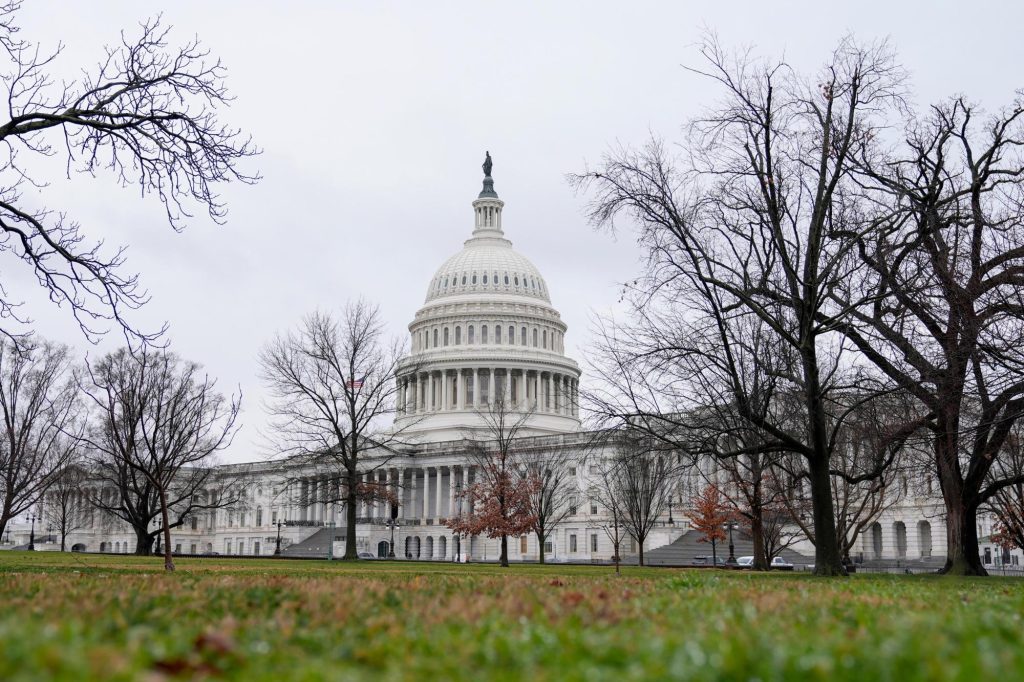By KEVIN FREKING (Associated Press)
WASHINGTON (AP) — Joe Biden approved a $460 billion package of spending bills passed by the Senate to prevent a shutdown of many important federal agencies. This success means lawmakers are halfway done with their work on the 2024 budget year's spending.
The package includes six yearly spending bills and had already been approved by the House. Biden thanked leaders and negotiators from both parties for their work, which allows agencies to continue operating normally.
At the same time, lawmakers are discussing another package of six bills, including defense, to ensure all federal agencies are fully funded by March 22.
“To folks who worry that divided government means nothing ever gets done, this bipartisan package says otherwise,” Senate Majority Leader Chuck Schumer, D-N.Y., said after lawmakers passed the measure Friday night just hours before a deadline.
Schumer mentioned that the bill's passing will lead to the hiring of more air traffic controllers and rail safety inspectors, higher pay for federal firefighters, and increased support for homeless veterans, among other things.
The Senate approved the bill with a vote of 75-22. Lawmakers wanted to have their say on the bill and other priorities during debate on the floor. It had been uncertain if senators would be able to avoid a short shutdown, but the bill's passage was always expected.
“I would urge my colleagues to stop playing with fire here,” said Sen. Susan Collins, the top-ranking Republican member of the Senate Appropriations Committee. “It would be irresponsible for us not to clear these bills and do the fundamental job that we have of funding government. What is more important?”
This vote happened more than five months into the current budget year after congressional leaders relied on a series of stopgap bills to keep federal agencies funded for a few more weeks or months at a time while they struggled to reach agreement on full-year spending.
In the end, the total discretionary spending set by Congress is expected to reach about $1.66 trillion for the full budget year ending Sept. 30.
Republicans were able to keep non-defense spending relatively stable compared to the previous year. Supporters see this as progress in a time when yearly federal deficits exceeding $1 trillion are common. However, many Republican lawmakers wanted larger cuts and more policy wins.
The House Freedom Caucus, which includes many of the GOP’s most conservative members, encouraged Republicans to oppose the first spending package and the second one that is still being negotiated.
Democrats were able to prevent most of the policy changes that Republicans wanted to include in the package. For instance, they stopped an attempt to block new rules that expand access to the abortion pill mifepristone. They also fully funded a nutrition program for low-income women, infants and children, providing about $7 billion for the WIC program, a $1 billion increase from the previous year.
Republicans had some policy victories. One rule will stop the sale of oil from the Strategic Petroleum Reserve to China. Another rule prevents the Justice Department from probing parents who speak freely at local school board meetings.
Another rule strengthens gun rights for certain veterans, but opponents say it could make it easier for those with serious mental health issues like dementia to get a firearm.
Sen. Patty Murray, the Democratic chair of the Senate Appropriations Committee, said, “This isn’t the package I would have written on my own. But I am proud that we have safeguarded essential funding that Americans depend on in their everyday lives.”
Sen. Rand Paul, R-Ky., said the bill had too much compromise, leading to excessive spending.
“Many people don’t realize this,” he said. “They believe there is no cooperation in Washington, but that's not true. There is compromise every day on every spending bill.”
“It’s a compromise between big-government Democrats and big-government Republicans,” he added.
However, a bill without support from members of both parties has no chance of passage in a divided Congress with a Democratic-led White House.
The bill also includes over 6,600 projects requested by individual lawmakers costing about $12.7 billion. Some Republican members criticized the projects, though members from both parties broadly joined in requesting them for their states and congressional districts. Paul called the spending “a way to ease in billions and trillions of other dollars by giving them a little bit of pork for their town, a little bit of pork for their donors.”
Sen. Rick Scott, R-Fla, tried to remove the projects, but only 32 votes supported it with 64 against. Murray said Scott’s effort would overrule “all the hard work, all the input we asked everyone to provide us about projects that would help their constituents.”
Although lawmakers passed spending bills five months into the budget year, Republicans present the process as improved because they broke the cycle of passing all the spending bills in one massive package that lawmakers have little time to study before voting or risk a government shutdown. However, others said that breaking up funding into two chunks of legislation hardly constitutes a breakthrough.
The first package covers the departments of Justice, Veterans Affairs, Agriculture, Interior and Transportation, among others.









